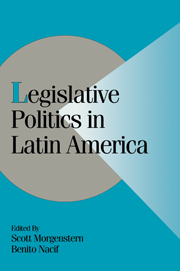Book contents
- Frontmatter
- Contents
- Tables and Figures
- Contributors
- Preface and Acknowledgments
- Party Names and Other Acronyms and Abbreviations
- 1 TOWARDS A MODEL OF LATIN AMERICAN LEGISLATURES
- Part I Executive–Legislative Relations
- Part II Political Parties and Legislative Structure
- 6 EXPLAINING THE HIGH LEVEL OF PARTY DISCIPLINE IN THE ARGENTINE CONGRESS
- 7 PARTY DISCIPLINE IN THE CHAMBER OF DEPUTIES
- 8 PARTIES, COALITIONS, AND THE CHILEAN CONGRESS IN THE 1990s
- 9 UNDERSTANDING PARTY DISCIPLINE IN THE MEXICAN CHAMBER OF DEPUTIES: THE CENTRALIZED PARTY MODEL
- Part III Legislatures and the Policy Process
- Part IV Conclusions
- References
- Author Index
- General Index
6 - EXPLAINING THE HIGH LEVEL OF PARTY DISCIPLINE IN THE ARGENTINE CONGRESS
Published online by Cambridge University Press: 14 January 2010
- Frontmatter
- Contents
- Tables and Figures
- Contributors
- Preface and Acknowledgments
- Party Names and Other Acronyms and Abbreviations
- 1 TOWARDS A MODEL OF LATIN AMERICAN LEGISLATURES
- Part I Executive–Legislative Relations
- Part II Political Parties and Legislative Structure
- 6 EXPLAINING THE HIGH LEVEL OF PARTY DISCIPLINE IN THE ARGENTINE CONGRESS
- 7 PARTY DISCIPLINE IN THE CHAMBER OF DEPUTIES
- 8 PARTIES, COALITIONS, AND THE CHILEAN CONGRESS IN THE 1990s
- 9 UNDERSTANDING PARTY DISCIPLINE IN THE MEXICAN CHAMBER OF DEPUTIES: THE CENTRALIZED PARTY MODEL
- Part III Legislatures and the Policy Process
- Part IV Conclusions
- References
- Author Index
- General Index
Summary
Politicians and academics consider party discipline in the Argentine Congress to be (comparatively) very high (Jones 1997a; Molinelli 1991; Mustapic and Goretti 1992). While the conventional wisdom of high levels of party discipline is nearly universal in Argentina, there have been no empirical studies of roll-call voting behavior during the post-1983 era and virtually no structured attempts to explain the principal sources of this high level of discipline.
This chapter has two goals. First, undertaking the first analysis of rollcall votes in the post-1983 period, it underscores the comparatively high levels of party discipline in the Argentine Chamber of Deputies. Second, it identifies the primary determinants of this highly disciplined voting behavior.
Argentine Political Institutions
Argentina is a federal republic consisting of 23 provinces and a semiautonomous federal capital. It has a presidential form of government with a bicameral legislature and since 1983 has represented one of Latin America's most vibrant and successful democracies.
The Argentine Chamber of Deputies has 257 members, who are elected from multimember districts (the 23 provinces and the federal capital) for four-year terms. The deputies are elected from closed party lists using the d'Hondt divisor form of proportional representation. In the event that a deputy dies or resigns during office, he/she is replaced by the next person on the party list who has not yet occupied a Chamber seat. One-half (127 and 130) of the Chamber is renewed every two years, with every district renewing one-half of its legislators (or the closest equivalent).
- Type
- Chapter
- Information
- Legislative Politics in Latin America , pp. 147 - 184Publisher: Cambridge University PressPrint publication year: 2002
- 49
- Cited by

